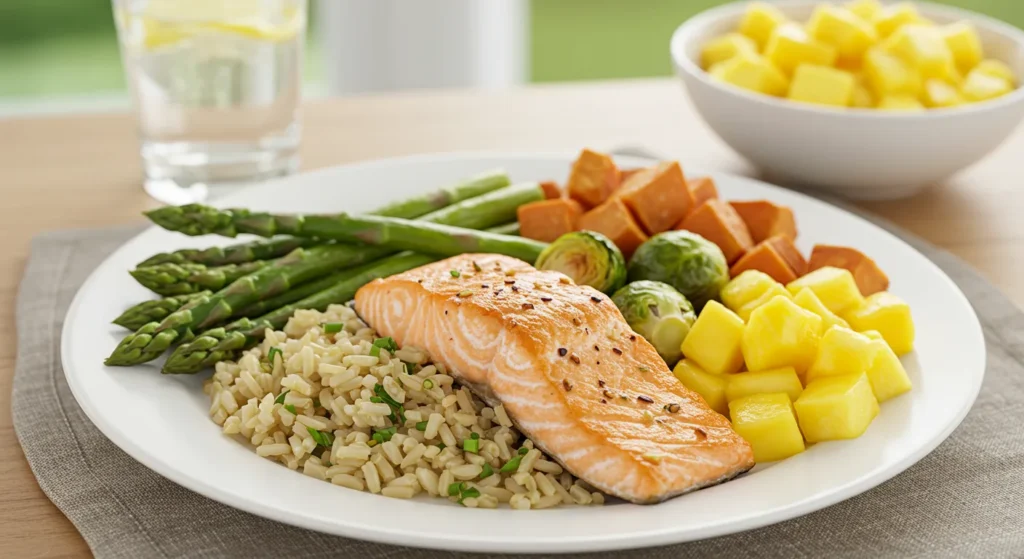Introduction
You finally did it. Whether you’re inches from your goal weight or you’ve already hit it, it’s a huge deal. But if you’re anything like me, there’s a nagging voice in your head saying, “How do I keep this off?” Because if I’m being honest, I’ve lost weight so many times, only to watch it slowly creep back up. It’s frustrating, exhausting, and confusing. The real challenge, it turns out, isn’t just losing the weight—it’s keeping it off for good.
That’s what this post is all about: how to build a sustainable lifestyle that supports long-term weight maintenance, based on research and practical strategies that actually work. Whether you’ve reached your goal or you’re on your way there, this guide will give you the tools you need to shift from “dieting” to living healthy.

Understanding Why Maintenance Feels So Hard
Let’s start with the truth: your body works against you when you lose weight. Studies show that more than 80% of people regain lost weight within five years. The odds aren’t great, but they’re not impossible to beat either. Source
Your Metabolism Slows Down
As you lose weight, your metabolism adapts. It gets more “efficient,” which sounds good, but really means it burns fewer calories than before. That means you can be eating the same amount and still gain weight. Source
Hunger Hormones Go Haywire
Leptin (which makes you feel full) drops, while ghrelin (which makes you hungry) shoots up. This can create a “perfect storm” where you feel hungrier and burn fewer calories. Source
Real Life Doesn’t Stop
Add in stress, ultra-processed foods everywhere, and a sedentary lifestyle, and the odds feel stacked. No wonder I kept gaining the weight back every time I stopped “dieting.”
What Actually Works: Lessons from the Long-Term Maintainers
Thankfully, there are thousands of people who do keep the weight off, and researchers have figured out what they do differently. The National Weight Control Registry tracked more than 4,000 people who maintained at least 10% of their weight loss for over a year. Here’s what they had in common:
1. They Monitor Themselves Often
They weigh themselves regularly (usually weekly or daily) to catch gains early. It’s like your weight dashboard: if something’s off, you fix it before it becomes a big issue. Source
Pro tip: I used to avoid the scale like it was the enemy. Now I treat it like a smoke detector—a tool, not a judgment.
2. They Keep Logging
Whether it’s food tracking apps or plain old pen and paper, successful maintainers log what they eat. It keeps them honest and helps avoid “accidental” overeating. Source
3. They Stick to Routines
They eat at consistent times, prep meals at home, and don’t swing wildly between cheat days and detoxes. That kind of rollercoaster? That was my yo-yo diet lifestyle for years.

Build the Habits That Support Maintenance
Consistency Over Perfection
Weight maintenance isn’t about never enjoying cake again. It’s about eating in a way that feels doable long term. One thing that helped me was switching from “I can never have that” to “I can have it, but do I really want it today?”
Quick Table: Daily Eating Patterns of Weight Maintainers
| Habit | % of Maintainers Who Do This |
|---|---|
| Eat breakfast daily | 78% |
| Eat home-cooked meals 5+ days/week | 90% |
| Rarely eat fast food | 80% |
| Limit sugary drinks | 87% |
Based on data from the National Weight Control Registry
Nutrient-Dense Foods Matter
Even when you’re not “dieting,” quality counts. Whole grains, lean proteins, fruits, veggies—those foods keep you fuller longer and help with energy and mood too.
Keep Moving
You don’t have to become a gym rat. Just aim for movement every day. The registry maintainers average about an hour of moderate exercise daily—walking, biking, dancing, gardening. It all counts. Source
Fun fact: Walking your dog can be part of your maintenance plan. Bonus points if the dog is stubborn and adds resistance training.

Mastering the Mental Game
Build a Maintenance Mindset
You know what always tripped me up? I kept treating weight loss like a sprint. Once I hit my goal, I’d relax—and that’s when the scale would climb again.
Real success comes from shifting your mindset: this isn’t a “diet.” This is how you live now.
Know Your Why
People who maintain their weight loss often have deep, personal reasons—not just to look good in jeans, but to avoid diabetes, reduce joint pain, or stay active for their kids. When things get hard, reconnecting to your “why” can keep you going. Source
Expect Lapses—Then Bounce Back
Everyone slips. What separates maintainers is how fast they bounce back. Having a plan helps:
- Missed a week of workouts? Schedule one today.
- Overate last night? Eat normally today.
- Feeling “blah”? Review your non-scale wins: better sleep, clearer skin, more energy.
I used to let one bad day turn into a bad month. Now, I just say, “Okay, that happened. What’s next?”

Use Support and Tech (They Work!)
You Don’t Have to Do This Alone
While a lot of people lose weight on their own, studies show that ongoing support from a coach, group, or even a friend improves maintenance odds. Source
When I had someone to check in with, I stayed more accountable. Even an online group made a difference.
Digital Tools That Help
Apps like MyFitnessPal, Lose It, and Fitbit can make tracking and self-monitoring easier. Some even offer community forums and coaching.
Researchers are exploring how these tools can use behavior-change science to stay effective long-term. Source. The key is consistency and using the tool that fits your lifestyle.

Flexibility Is Your Friend
Structure Without Rigidity
Successful maintainers don’t follow strict rules every day. Instead, they build flexible routines:
- They plan ahead for vacations or events
- They learn to “course correct” without guilt
- They stay mindful without obsessing
This keeps burnout low and motivation high. All-or-nothing thinking used to sabotage me; now, I aim for “good enough.”
Focus Beyond the Scale
Over time, weight becomes just one measure. Health markers like blood pressure, cholesterol, mood, sleep, and energy tell a more complete story.
When I shifted my focus to those areas, I felt more in control, even when my weight fluctuated a few pounds.
Final Thoughts: Make This Life Yours
Sustainable weight maintenance isn’t about perfection. It’s about building a life you don’t need to escape from. That means:
- Being honest with yourself
- Planning ahead (but not obsessing)
- Staying flexible
- Finding joy in feeling good—not just looking good
Your journey doesn’t end when the scale hits a number. In many ways, that’s when it really begins. But this time, you’re not winging it. You’ve got the data, the tools, and the mindset to build a life that lasts.
Want more tips, tools, and personal stories? Check out this article from Johns Hopkins for deeper insights, or join a supportive online community to stay inspired.








